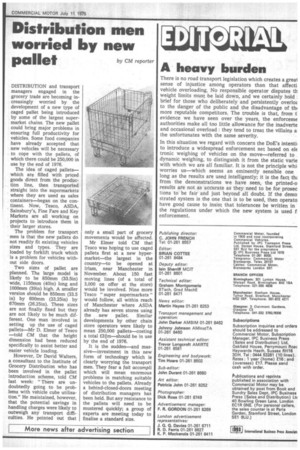Distribution men worried by new
Page 7

If you've noticed an error in this article please click here to report it so we can fix it.
pallet by CM reporter DISTRIBUTION and transport managers engaged in the grocery trade are becoming increasingly worried by the development of a new type of caged pallet being introduced by some of the largest supermarket chains. The new pallet could bring major problems in ensuring full productivity for vehicles. Some food companies have already accepted that new vehicles will be necessary to cope with the pallets, of which there could be 250,000 in use by the end of 1976.
The idea of caged pallets— which are filled with priced goods direct from the production line, then transported straight into the supermarkets where they are used as sales containers—began on the continent. Now, Tesco, ASDA, Sainsbury's, Fine Fare and Key Markets are all working on projects to introduce them in their larger stores.
The problem for transport men is that the new pallets do not readily fit existing vehicles sizes and types. They are loaded by forklift truck which is a problem for vehicles without side doors.
Two sizes of pallet are planned. The large model is likely to be 850mm (33.5in) wide, 1150mm (40M) long and 1000mm (39in) high. A smaller version should be 850mm (33.5 in) by 600mm (23.25in) by 670mm (26.251n). These sizes are not finally fixed but they are not likely to be much different. One man involved in setting up the use of caged pallets—Mr D. Elmer of Tesco —told CM that the height dimension had been reduced specifically to assist better and easier vehicle loading.
However, Dr David Walters, a consultant to the Institute of Grocery Distribution who has been involved in the pallet introduction scheme, told CM last week: "There are undoubtedly going to be problems with vehicle cube utilisation." He maintained, however, that the potential savings in handling charges were likely to outweigh any transport difficulties. He pointed out that only a small part of grocery movements would be affected.
Mr Elmer told CM that Tesco was hoping to use caged pallets first at a new hypermarket—the largest in the country—to be opened at Irlam, near Manchester in November. About 150 fast moving lines (of a total of 3,000 on offer at the store) would be involved. Nine more Tesco " super supermarkets " would follow, all within reach of Manchester where ASDA already has seven stores using the new pallet. Similar developments by other chain store operators were likely to mean 250,000 pallets—costing a total £3m—should be in use by the end of 1976.
It is the sudden—and massive—investment in this new form of technology which is clearly worrying the transport men. They fear a fait accompli which will mean enormous problems in matching suitable vehicles to the pallets. Already a behind-closed-doors meeting of distribution managers has been held. But any resistance to the pallets will need to be mustered quickly; a group of experts are meeting today to finalise a standard size.












































































































































